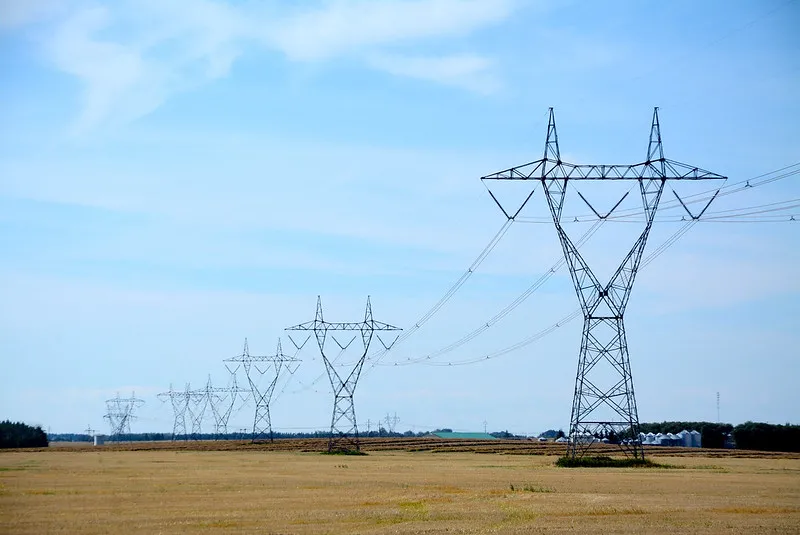Binnu Jeyakumar, director of the Pembina Institute’s clean electricity program, attended COP27 in Egypt this month. Here she reflects on the momentum she witnessed at the conference, and what Canada’s priorities should be on electricity in the year ahead.
It is difficult to come away from an event like COP27 without feeling a sense of huge responsibility. There is so much that we still need to get done, if we are to keep Canada – and the world – on track to net-zero emissions by 2050.
But this responsibility to tackle climate change is also an opportunity. In the electricity sector (as in many other sectors), the solutions that can cut our emissions can also help create economic development opportunities and a more reliable, affordable and equitable energy system for all of us. And that’s predominantly the feeling that I observed at the side events at COP27, as well as with a few other significant announcements that happened in parallel.
Firstly, I saw a lot of evidence that industry is beginning to appreciate the economic opportunities of the energy transition. While there might still be political disagreement on the scale of action needed, both clean energy and incumbent power developers were signaling that they do not want to be left behind. The industry leaders I observed have now moved well beyond the question of whether we should take action or not, and are focused on the pace of action and the practical challenges. This is important, not least because of the scale of private capital that we know is going to be needed: to reach net-zero by 2050, the International Energy Agency projects that total global investment in clean energy (estimated at US$ 1.4 trillion in 2022) will need to triple this decade; a cost that cannot be borne by governments alone. For example, I facilitated a panel discussion with renewables developers Siemens Gamesa, Iberdrola, and Gazelle Wind Power, where we discussed how we can unlock supply chains – and do so in a sustainable manner – to meet the projected global growth of wind energy (which is expected to quadruple by 2030).
Second – I was inspired and excited by the focus on ensuring that the transition to clean energy is just and equitable, in a manner that benefits as many people as possible. There were dialogues happening everywhere on how to ensure that women, people of colour, LGBTQ2S+ folks, and Indigenous peoples can lead and enjoy the benefits of the new clean energy economy.The Pembina Institute added to the conversation by hosting almost 30 women leaders and allies for a workshop on Women in the Energy Transformation at the Canadian Pavilion. This event built off a series of engagements that Pembina has been doing to advance gender and an equitable transition to net-zero. Gender equity is something we’ve been working on at Pembina for some time now, as we keep making the positive case for a major shift in how energy is produced and consumed in Canada.
Finally– and perhaps this one goes without saying – I was reminded of the critical importance of international collaboration. The level of conversations at various multi-national events really underscored the urgency and value of cooperation in decarbonizing electricity. A great illustration is the Powering Past Coal Alliance (PPCA) – an initiative dedicated to encouraging the phase-out of coal-fired electricity generation around the world, which Pembina is part of – celebrated its fifth anniversary. The PPCA was made possible by visionary leadership from Canada and the UK, and is an excellent example of where diplomacy, ambition and practical solutions can meet, and create big changes that might have once seemed impossible (Alberta’s commitment to fully phase-out coal next year being one of those previously impossible hurdles that we’ve now cleared!) The anniversary event included the sharing of great lessons on grid transition and community engagement from members such as TransAlta, Senegal, and Chile.
So, what is Canada’s electricity homework from COP27?
Overall, as we look to the year ahead, Canada must demonstrate domestic leadership on climate action to have credibility as an international leader. Here are a few follow-ups we’ll be looking for over the next year, as we continue our work with governments and industry in Canada on clean energy:
- Deliver a robust Clean Energy Regulation – This is a landmark regulation currently under development, which – if well-designed – will help Canada achieve its goal of a nationwide net-zero grid by 2035. While it will also be supported by other measures, the regulation needs to be stringent enough to set industry on a path to clean power. One marker of success will be if investments in new emitting generation (such as unabated natural gas-fired power plants) are scaled down, while investments in clean power are scaled up.
- Invest significantly in clean electricity solutions – Beyond regulation, there is also the need for more government support for other solutions such as battery storage, energy efficiency, interprovincial transmission and distribution network upgrades. All of these will be key to Canada having a well-functioning net-zero grid by 2035. This year, the COP27 text explicitly mentioned the need to accelerate renewables. Canada unfortunately is a laggard in this regard and needs to make investments proportional to the U.S. and other peers.
- Create and fund a comprehensive just transition plan – Building off our recommendations around supporting workers and communities affected by coal phase-out, Canada needs to deliver a larger plan that is able to support other impacted workers and communities in accessing opportunities in clean energy.
- Strive to lead internationally on decarbonizing the grid past the coal phase-out – Leveraging our success in phasing out coal, we need to work together with other countries such as the UK, U.S., and Germany – all of whom also have a clean grid by 2035 target – to advance net-zero grid ambitions and actions in other countries. In doing so, we’ll create opportunities to learn from each other in a way that can help us maintain the pace and address the complex challenges that are associated with rapid grid decarbonization.









